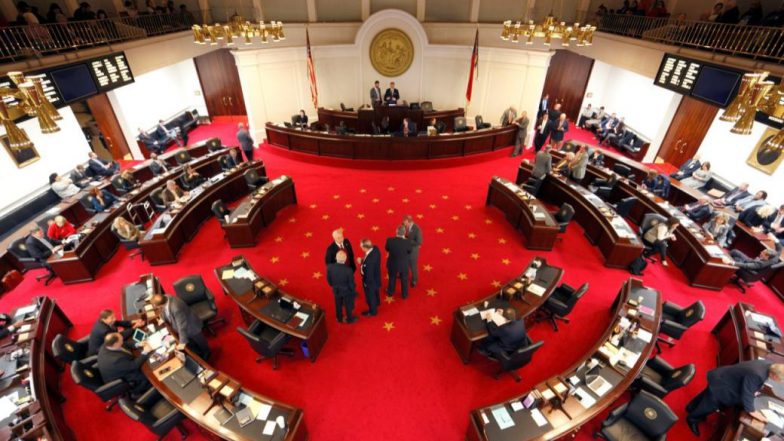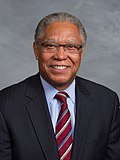Summary
The North Carolina Senate is the upper chamber of the North Carolina General Assembly, which along with the North Carolina House of Representatives—the lower chamber—comprises the state legislature of North Carolina.
The Senate’s prerogatives and powers are similar to those of the other house, the House of Representatives. Its members do, however, represent districts that are larger than those of their colleagues in the House. The President of the Senate is the Lieutenant Governor of North Carolina, but the Lt. Governor has very limited powers and only votes to break a tie.
OnAir Post: North Carolina State Senate
Wikipedia
Contents
The North Carolina Senate is the upper chamber of the North Carolina General Assembly, which along with the North Carolina House of Representatives—the lower chamber—comprises the state legislature of North Carolina. The Senate has 50 members, and the term of office for each senator is two years.[1]
The Senate's prerogatives and powers are similar to those of the other house, the House of Representatives. Its members do, however, represent districts that are larger than those of their colleagues in the House. The president of the Senate is the lieutenant governor of North Carolina, but the lieutenant governor has very limited powers and only votes to break a tie. Before the office of lieutenant governor was created in 1868, the Senate was presided over by a "speaker." After the 1988 election of James Carson Gardner, the first Republican lieutenant governor since Reconstruction, Democrats in control of the Senate shifted most of the power held by the lieutenant governor to the senator who is elected president pro tempore (or pro-tem). The president pro tempore appoints members to standing committees of the Senate, and holds great sway over bills.
According to the state constitution, the Senate is also the "Court for the Trial of Impeachments". The House of Representatives has the power to impeach state officials, after which the Senate holds an impeachment trial, as in the federal system. If the governor or lieutenant governor is the official who has been impeached, the chief justice of the North Carolina Supreme Court presides.
History
During the Reconstruction era, African Americans served in the state senate (African American officeholders from the end of the Civil War until before 1900). By 1874 four African Americans, all Republicans, were in the body as Democrats had already regained a large majority 38 to 12.[2] In 1920, Loula Roberts Platt, became the first woman to run for a seat in the state senate.[citation needed]
Qualifications
The qualifications to be a senator are found in the state Constitution: "Each Senator, at the time of his election, shall be not less than 25 years of age, shall be a qualified voter of the State, and shall have resided in the State as a citizen for two years and in the district for which he is chosen for one year immediately preceding his election."
2025–26 composition
| Affiliation | Party (shading indicates majority caucus) | Total | ||
|---|---|---|---|---|
| Republican | Democratic | Vacant | ||
| End of (2021–22) legislature | 28 | 22 | 50 | 0 |
| Beginning of previous (2023–24) legislature | 30 | 20 | 50 | 0 |
| End of previous (2023–24) legislature | 30 | 20 | 50 | 0 |
| Beginning of current (2025–26) legislature | 30 | 20 | 50 | 0 |
| Latest voting share | 60% | 40% | ||
Leadership
| North Carolina Senate[3] officers | ||
|---|---|---|
| Position | Name | Party |
| President Pro Tempore | Phil Berger | Republican |
| Deputy President Pro Tempore | Ralph Hise | Republican |
| Majority Leader | Michael V. Lee | Republican |
| Majority Whip | Amy Galey | Republican |
| Majority Whip | Todd Johnson | Republican |
| Joint Majority Caucus Leader | Carl Ford | Republican |
| Minority Leader | Sydney Batch | Democratic |
| Minority Whip | Jay Chaudhuri | Democratic |
| Minority Caucus Secretary | Julie Mayfield | Democratic |
Membership
- ↑: Member was originally appointed to fill the remainder of an unexpired term.
Past composition of the Senate
Coat of arms
 |
|
See also
References
- ^ "North Carolina State Senate". ballotpedia.org. Ballotpedia. Retrieved July 27, 2022.
- ^ de Roulhac Hamilton, Joseph Grégoire (1914). Reconstruction in North Carolina.
- ^ "Leadership - North Carolina General Assembly". www.ncleg.gov. Retrieved June 19, 2021.
- ^ "SENATE OF NORTH CAROLINA". College of Arms Newsletter. College of Arms. Retrieved August 16, 2023.




















































